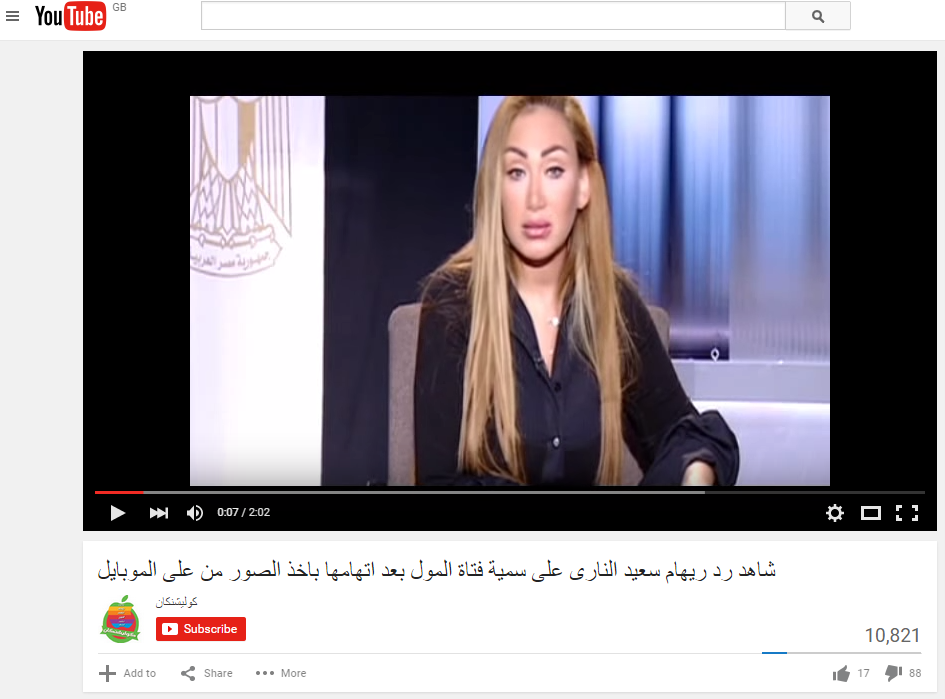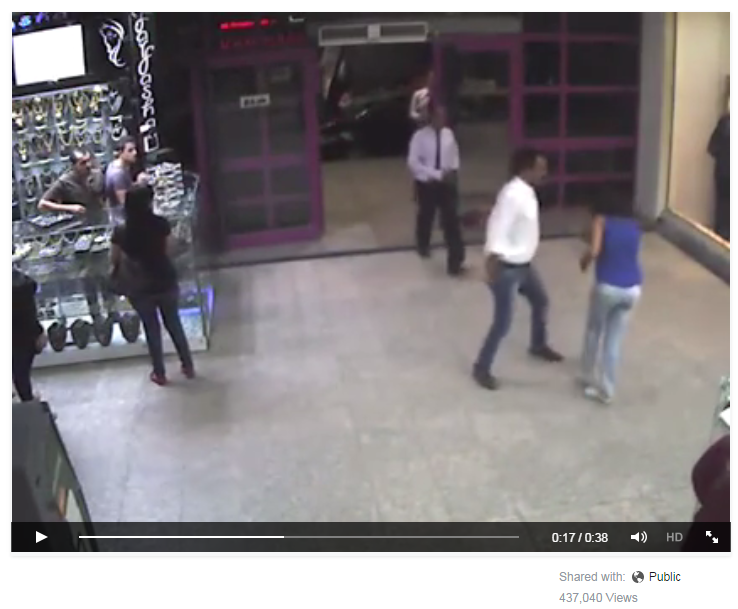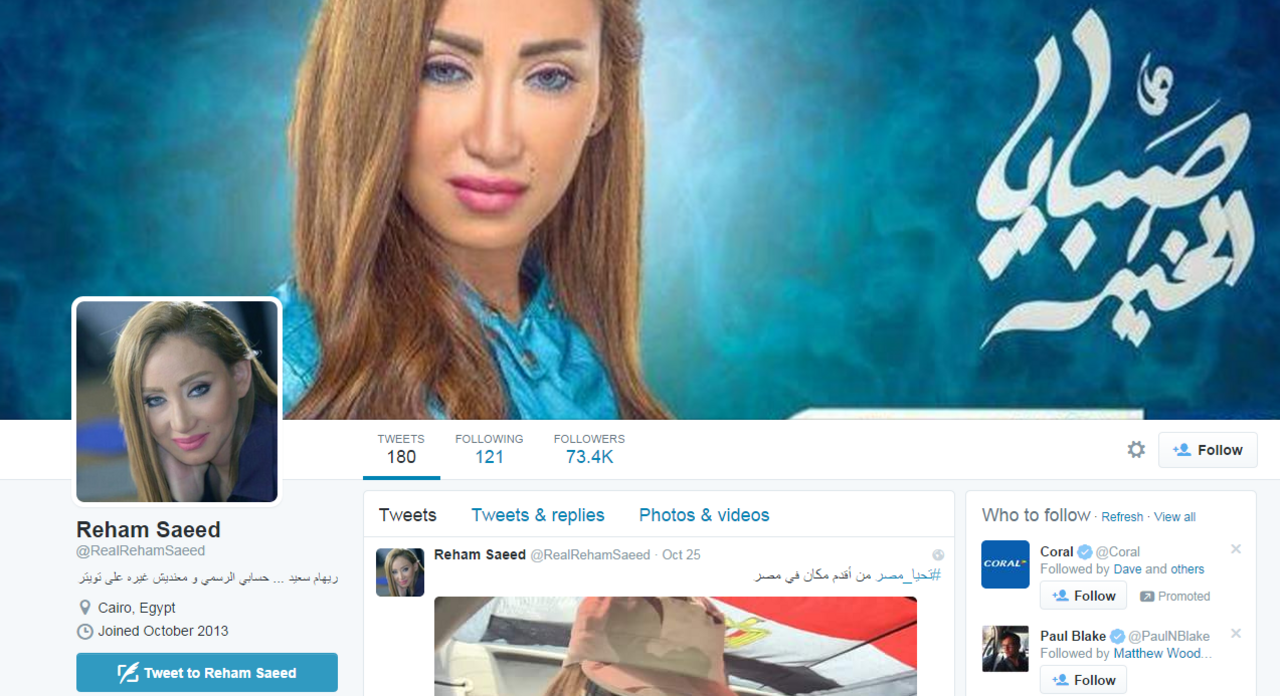Alleged assault victim asked: 'Do you think you were dressed appropriately?'
- Published

Reham Saeed accused a woman of provoking sexual harassment by wearing "revealing clothes"
Thousands of Egyptians are turning on the TV host who said a victim of alleged sexual assault wore "revealing clothes" - and the programme at the centre of the case has now been temporarily suspended.
The story began when a violent confrontation was captured on closed-circuit television. A man and a woman walk into the frame and seem to be arguing in the middle of the shopping mall when suddenly the man reaches out and slaps the woman, before he's restrained by mall security and onlookers. The woman in the footage complained to the police that the man was sexually harassing her.
But the local police didn't arrest him, so she took her case to the court of public opinion, posting the video on Facebook, where it has been viewed nearly half a million times. She has also made several TV appearances. alleging the police didn't arrest her alleged attacker because he's well known in the area.
But none of this was what really got Egyptians talking.
Instead, what has now gone viral was what happened when the woman, who we are not naming given the online abuse now being directed at her, gave an interview to provocative TV presenter Reham Saeed. In the course of that discussion, Saeed challenged the woman, suggesting that it was what she was wearing that provoked the harassment.
"Do you think you were dressed appropriately?" Saeed asked the guest. (In the mall CCTV footage, the woman is wearing jeans and a sleeveless top). The presenter then went even further, showing older photos of the woman and accusing her of wearing "revealing clothes" - for instance, one shot showed her in a bikini.
On Friday, the TV network tweeted out a statement, external saying that Saeed's programme would be temporarily suspended. The programme was facing an advertising boycott, according to reports, external.

A screenshot from the video of the original attack in the shopping mall, which was watched by hundreds of thousands online.
Saeed is no stranger to controversy. Recently she was criticised for insulting Syrians in a refugee camp in Lebanon, and she's also had heated debates with atheists, Muslim clerics and others. The woman at the centre of the story alleges that Saeed's producers looked through her phone to find the pictures while she was waiting in the studio. Saeed denied that and said that viewers sent the photos to her on Whatsapp. Both the woman and Saeed traded claims and counter-claims in subsequent TV broadcasts.
But no matter how the pictures were obtained, many Egyptians online, both liberal and conservative, were condemning Saeed and saying she was encouraging violence and harassment against women.
"We have to get rid of the nightmare called Riham Saeed," wrote one activist, while another tweeted: "You're so despicable. It upsets me how you don't even deserve all of this propaganda, yet you thrive on it."
Saeed herself was then targeted online. She was trolled by a hashtag that translates as "Die Reham", with some users posting graphic pictures or descriptions of how they hoped she would meet an untimely end. More than 14,000 messages using the tag were posted in 24 hours. Other Arabic hashtags including "Reham Saeed" and "Prosecute Reham Saeed" also trended in Egypt, with many calling for a boycott of her programme and the network that broadcasts it, the privately owned Al-Nahar TV channel.

When contacted by BBC Monitoring, the liberal activist and blogger who started the "Die Reham" hashtag claimed he originally started it as a "joke".
"People strongly reacted to it and it turned into a serious event," Wael Abbas says. Abbas says he thinks Saeed "lacks professionalism" and "insulted both her guests and audience," and says he's generally concerned about media standards in Egypt.
A prominent lawyer who also condemned Saeed says he and a group of legal experts are prepared to represent the woman at the centre of the case if she chooses to pursue legal action against the TV presenter and the channel.
"Reham Saeed was sending a clear cut message through her show that any female victim who dares to expose her harasser will be slandered in the media, thus intimidating people to conceal the truth about such crimes," says Muhammad Abd-al-Aziz, head of the Haqaniyah Centre.
The BBC has attempted to contact Said, Al-Nahar TV and the woman at the centre of the case for comment.
A recent UN report said that nearly all Egyptian women - more than 99% - have experienced some form of sexual assault, external. In June 2013 the government introduced a law including new punishments designed to crack down on sexual harassment.
Reporting by Neveen Youssef, BBC Monitoring and Mai Noman
Blog by Mike Wendling, external
Next story: How the annual poppy appeal has been hijacked online

Poppies are a common sight on British shirts and coats this time of year - but online some people are using the burst of poppy popularity to push their political agendas. READ HERE
You can follow BBC Trending on Twitter @BBCtrending, external, and find us on Facebook, external. All our stories are at bbc.com/trending.